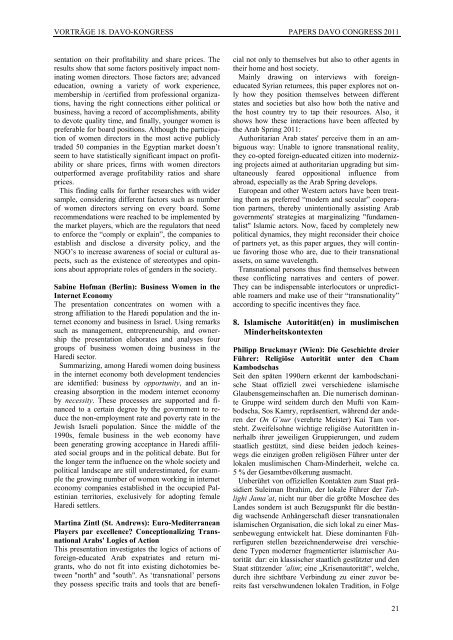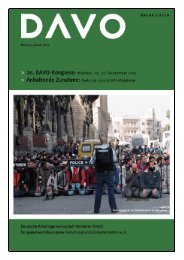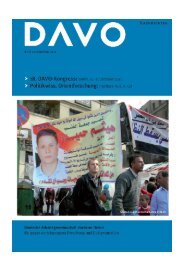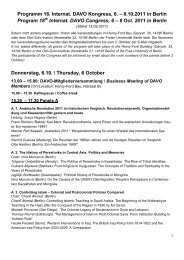4 Dissertationen und Habilita- tionen / Dissertations and Habilitations
4 Dissertationen und Habilita- tionen / Dissertations and Habilitations
4 Dissertationen und Habilita- tionen / Dissertations and Habilitations
Sie wollen auch ein ePaper? Erhöhen Sie die Reichweite Ihrer Titel.
YUMPU macht aus Druck-PDFs automatisch weboptimierte ePaper, die Google liebt.
VORTRÄGE 18. DAVO-KONGRESS PAPERS DAVO CONGRESS 2011<br />
sentation on their profitability <strong>and</strong> share prices. The<br />
results show that some factors positively impact nominating<br />
women directors. Those factors are; advanced<br />
education, owning a variety of work experience,<br />
membership in /certified from professional organizations,<br />
having the right connections either political or<br />
business, having a record of accomplishments, ability<br />
to devote quality time, <strong>and</strong> finally, younger women is<br />
preferable for board positions. Although the participation<br />
of women directors in the most active publicly<br />
traded 50 companies in the Egyptian market doesn’t<br />
seem to have statistically significant impact on profitability<br />
or share prices, firms with women directors<br />
outperformed average profitability ratios <strong>and</strong> share<br />
prices.<br />
This finding calls for further researches with wider<br />
sample, considering different factors such as number<br />
of women directors serving on every board. Some<br />
recommendations were reached to be implemented by<br />
the market players, which are the regulators that need<br />
to enforce the “comply or explain”, the companies to<br />
establish <strong>and</strong> disclose a diversity policy, <strong>and</strong> the<br />
NGO’s to increase awareness of social or cultural aspects,<br />
such as the existence of stereotypes <strong>and</strong> opinions<br />
about appropriate roles of genders in the society.<br />
Sabine Hofman (Berlin): Business Women in the<br />
Internet Economy<br />
The presentation concentrates on women with a<br />
strong affiliation to the Haredi population <strong>and</strong> the internet<br />
economy <strong>and</strong> business in Israel. Using remarks<br />
such as management, entrepreneurship, <strong>and</strong> ownership<br />
the presentation elaborates <strong>and</strong> analyses four<br />
groups of business women doing business in the<br />
Haredi sector.<br />
Summarizing, among Haredi women doing business<br />
in the internet economy both development tendencies<br />
are identified: business by opportunity, <strong>and</strong> an increasing<br />
absorption in the modern internet economy<br />
by necessity. These processes are supported <strong>and</strong> financed<br />
to a certain degree by the government to reduce<br />
the non-employment rate <strong>and</strong> poverty rate in the<br />
Jewish Israeli population. Since the middle of the<br />
1990s, female business in the web economy have<br />
been generating growing acceptance in Haredi affiliated<br />
social groups <strong>and</strong> in the political debate. But for<br />
the longer term the influence on the whole society <strong>and</strong><br />
political l<strong>and</strong>scape are still <strong>und</strong>erestimated, for example<br />
the growing number of women working in internet<br />
economy companies established in the occupied Palestinian<br />
territories, exclusively for adopting female<br />
Haredi settlers.<br />
Martina Zintl (St. Andrews): Euro-Mediterranean<br />
Players par excellence? Conceptionalizing Transnational<br />
Arabs' Logics of Action<br />
This presentation investigates the logics of actions of<br />
foreign-educated Arab expatriates <strong>and</strong> return migrants,<br />
who do not fit into existing dichotomies between<br />
"north" <strong>and</strong> "south". As ‘transnational’ persons<br />
they possess specific traits <strong>and</strong> tools that are benefi-<br />
cial not only to themselves but also to other agents in<br />
their home <strong>and</strong> host society.<br />
Mainly drawing on interviews with foreigneducated<br />
Syrian returnees, this paper explores not only<br />
how they position themselves between different<br />
states <strong>and</strong> societies but also how both the native <strong>and</strong><br />
the host country try to tap their resources. Also, it<br />
shows how these interactions have been affected by<br />
the Arab Spring 2011:<br />
Authoritarian Arab states' perceive them in an ambiguous<br />
way: Unable to ignore transnational reality,<br />
they co-opted foreign-educated citizen into modernizing<br />
projects aimed at authoritarian upgrading but simultaneously<br />
feared oppositional influence from<br />
abroad, especially as the Arab Spring develops.<br />
European <strong>and</strong> other Western actors have been treating<br />
them as preferred “modern <strong>and</strong> secular” cooperation<br />
partners, thereby unintentionally assisting Arab<br />
governments' strategies at marginalizing "f<strong>und</strong>amentalist"<br />
Islamic actors. Now, faced by completely new<br />
political dynamics, they might reconsider their choice<br />
of partners yet, as this paper argues, they will continue<br />
favoring those who are, due to their transnational<br />
assets, on same wavelength.<br />
Transnational persons thus find themselves between<br />
these conflicting narratives <strong>and</strong> centers of power.<br />
They can be indispensable interlocutors or unpredictable<br />
roamers <strong>and</strong> make use of their “transnationality”<br />
according to specific incentives they face.<br />
8. Islamische Autorität(en) in muslimischen<br />
Minderheitskontexten<br />
Philipp Bruckmayr (Wien): Die Geschichte dreier<br />
Führer: Religiöse Autorität unter den Cham<br />
Kambodschas<br />
Seit den späten 1990ern erkennt der kambodschanische<br />
Staat offiziell zwei verschiedene islamische<br />
Glaubensgemeinschaften an. Die numerisch dominante<br />
Gruppe wird seitdem durch den Mufti von Kambodscha,<br />
Sos Kamry, repräsentiert, während der <strong>and</strong>eren<br />
der On G’nur (verehrte Meister) Kai Tam vorsteht.<br />
Zweifelsohne wichtige religiöse Autoritäten innerhalb<br />
ihrer jeweiligen Gruppierungen, <strong>und</strong> zudem<br />
staatlich gestützt, sind diese beiden jedoch keineswegs<br />
die einzigen großen religiösen Führer unter der<br />
lokalen muslimischen Cham-Minderheit, welche ca.<br />
5 % der Gesamtbevölkerung ausmacht.<br />
Unberührt von offiziellen Kontakten zum Staat präsidiert<br />
Suleiman Ibrahim, der lokale Führer der Tablighi<br />
Jama’at, nicht nur über die größte Moschee des<br />
L<strong>and</strong>es sondern ist auch Bezugspunkt für die beständig<br />
wachsende Anhängerschaft dieser transnationalen<br />
islamischen Organisation, die sich lokal zu einer Massenbewegung<br />
entwickelt hat. Diese dominanten Führerfiguren<br />
stellen bezeichnenderweise drei verschiedene<br />
Typen moderner fragmentierter islamischer Autorität<br />
dar: ein klassischer staatlich gestützter <strong>und</strong> den<br />
Staat stützender ‛alim; eine „Krisenautorität“, welche,<br />
durch ihre sichtbare Verbindung zu einer zuvor bereits<br />
fast verschw<strong>und</strong>enen lokalen Tradition, in Folge<br />
21





